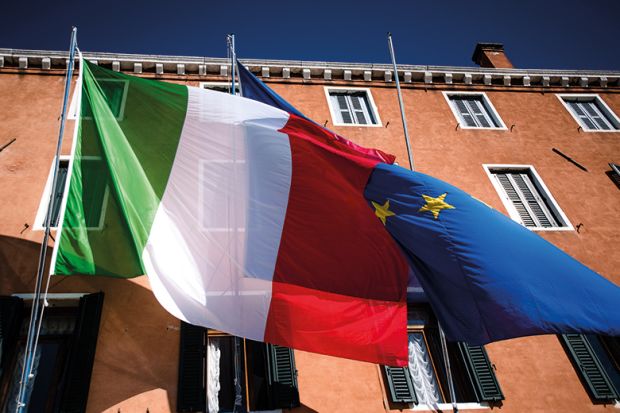Poland hit the headlines across Europe recently when its top court denied that the law of the European Union took precedence over national law on constitutional matters.
The ruling was widely seen as a fundamental challenge to the legal structure on which the EU is based. In the European Parliament on 19 October, commission president Ursula von der Leyen expressed her displeasure at the Polish prime minister, Mateusz Morawiecki, for bringing the challenge – to a constitutional tribunal dominated by his own appointees. Suddenly, the word “Polexit” started being widely circulated.
This is only the latest incident in a long line of flashpoints between the commission and Poland. In April 2020, for instance, the commission sent a “letter of formal notice” to Poland, alleging that it had failed to fulfil its treaty obligations to ensure the right to an effective remedy before an independent and impartial court.
Hungary, of course, is in even more open conflict with the commission on issues such as its crackdown on foreign-funded NGOs, LGBTIQ rights and refugee rights.
But while Poland and Hungary have a growing history of defying European law, Italy has a much longer track record.
I will be in court in Verona on 25 November 2021, the latest of umpteen appearances. My first was shortly after my daughter was born. She is now 36, and I am 70. The issue in question has remained the same throughout those three and a half decades: fair and equal pay and pension rights for overseas academics.
Non-discrimination on grounds of nationality was first enshrined in the Treaty of Rome in 1957. Yet scores of foreign lecturers in Italy are still seeking an “effective remedy”. Many colleagues have died, with their court cases still pending; others are surviving on reduced pensions of €800 (£682) a month.
The European Commission sent Italy a letter of formal notice on 23 September and issued a press release stating: “Italy is still discriminating against foreign lecturers.” If Italy does not address the matter by 23 November, the commission reserves the right to take Italy, once again, before the Court of Justice of the European Union (CJEU).
The trouble is that the CJEU has already ruled six times on foreign lecturers in cases regarding Italy, in 1989, 1993, 1997, 2001, 2006 and 2008. And yet still the discrimination endures. The European Parliament Petitions Committee, in its Citizenship Report of 2010, found ongoing “blatant discrimination on grounds of nationality…with respect to security of tenure, career development, pensions and social security”.
In short, Italian universities, bankrolled by their paymasters in the Italian state, are undermining the rule of law and are frustrating the goals of EU integration in the single market.
Particularly nefarious was the passing of the so-called Gelmini law, also in 2010, which provided for the “extinguishing” of pending court cases by foreign academics. This was, in essence, racist legislation since it specifically targeted a category of non-Italian workers.
Although we welcome the commission’s latest efforts to afford us foreign academics equal status, we must nevertheless wonder why, if the Italian state can circumvent six CJEU judgments, it could not circumvent a seventh.
Two articles in the Treaty of Rome contain flaws that thwart citizens from obtaining an effective remedy. Immigrant citizens may invoke Article 258 and complain to the commission that their EU rights are being infringed. The commission, using its wide discretionary powers, may or may not then contact the member state and may or may not bring it before the CJEU. Years of cat-and-mouse can ensue before the commission finally raises an action.
Most damningly of all, however, is the fact that complainants are extraneous to the entire legal proceedings. Neither they nor their lawyers have the right to be heard in the CJEU under this procedure. A member state may intervene (the UK did in the 2001 case), but not the injured party. This seems absurd. It is a basic principle of law that a person who believes they are being treated unfairly should have the right to have their complaint presented on their behalf in open court.
Meanwhile, Article 267 of the treaty permits citizens to raise actions in national jurisdictions claiming discrimination based on nationality. If the domestic norms appear to be in conflict with EU norms, then judges may refer the case to the CJEU for a preliminary ruling. However, they are not bound to. Only the judges at the last tier of domestic courts “against whose decisions there is no remedy under national law” are bound by the treaty to refer to the CJEU. But there is no guarantee that the judges will come to the conclusion that there is a conflict – and no appeal procedure if they do not.
Hence the decades of frustration and underpayment endured by so many foreign academics in Italy. The open defiance of Poland’s ruling Law and Justice party may well represent a threat to the entire EU’s legal order. But no less so do the more insidious cankerworm tactics of the Italian state.
David Petrie is chair of the Association of Foreign Lecturers in Italy (ALLSI).
Register to continue
Why register?
- Registration is free and only takes a moment
- Once registered, you can read 3 articles a month
- Sign up for our newsletter
Subscribe
Or subscribe for unlimited access to:
- Unlimited access to news, views, insights & reviews
- Digital editions
- Digital access to THE’s university and college rankings analysis
Already registered or a current subscriber?








